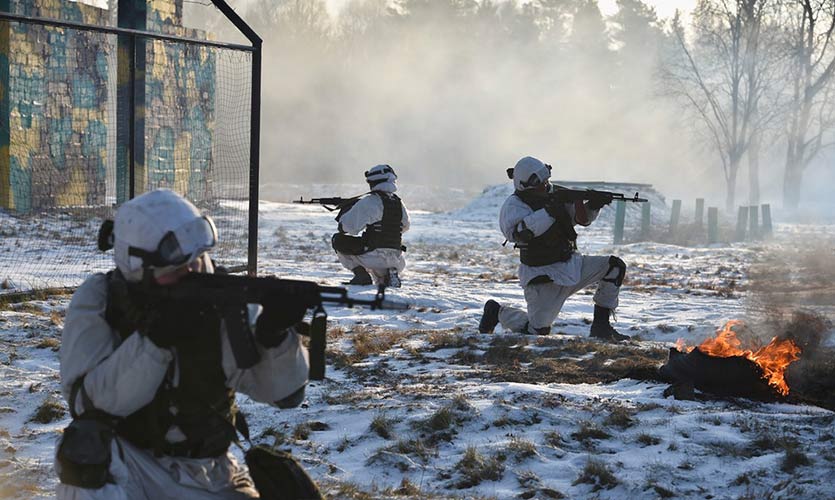Amid mounting tensions over Ukraine after Russia amassed more than 100,000 troops near its border that brought Moscow and Washington at direct loggerheads yet again, US Secretary of State Antony Blinken said in a written response that they have made no concessions to the main Russian demands over Ukraine and the North Atlantic Treaty Organization (NATO). “The document we’ve delivered includes concerns of the United States and our allies and partners about Russia’s actions that undermine security, a principled and pragmatic evaluation of the concerns that Russia has raised, and our own proposals for areas where we may be able to find common ground,” Blinken told reporters.
Shortly after Blinken’s statement, NATO Secretary-General Jens Stoltenberg said that the military alliance has sent their own written response to Moscow. Speaking to the media, Stoltenberg said, “We call on Russia once again to immediately deescalate the situation. NATO firmly believes that tensions and disagreements must be resolved through dialogue and diplomacy.”
Raising the deteriorating situation in eastern Europe where Russia has amassed its troops and other military and technological deployments, the NATO Secretary-General added, “We see more troops not only in and around Ukraine, but also now in Belarus where Russia is in the process of deploying thousands of troops, hundreds of aircraft, S-400 air defense systems and a lot of other very advanced capabilities.” To bring down these tensions that have already alarmed the security and economic domains, and could potentially alter the dynamics of geopolitics, Russia, Ukraine, NATO, and the US agreed to observe a ceasefire in the east of Ukraine at the Paris talks on Wednesday.
The focal point of the meeting was to resolve the conundrum between Ukrainian forces and pro-Russian separatists in the eastern part of Ukraine that has been witnessing extreme brutalities even since Russia annexed Crimea. The violence started after the pro-Russia president’s government faced agitations by the protesters in Ukraine who demanded that the country should ally with the EU and NATO, and not with Russia. Sensing that Russia could lose its strategic interests, it annexed the Crimean peninsula where a majority of Russian speaking people live. Ever since then, the eastern part of Ukraine has been witnessing extreme ups and downs, resulting in the deaths of 14,000 people and disappearance of millions.
The Paris negotiations ended with representatives of the four countries in the meeting – Russia, Ukraine, France, and Germany – agreeing to an “unconditional observance of the ceasefire” and deciding to meet again in Berlin in two weeks.
An aid to French President Emmanuel Macron said that while the meeting was not directly about the larger crisis, “the question was whether the Russians wanted to signal a thaw”. “In the current circumstances, we received a good signal”, he added.
On Wednesday, Antony Blinken also had a telephonic conversation with China’s Foreign Minister Wang Yi on the Ukraine crisis. China’s close proximity with Russia has been a cause of concern for the West. However, the Chinese foreign ministry said in a statement to Blinken, “We call on all parties to stay calm and refrain from doing things that agitate tensions and hype up the crisis.” .
The US and the EU have been at direct confrontation with Russia for the past few weeks and have warned it of serious consequences if it invades Ukraine. While Russia denies any such allegations, it has demanded that Ukraine and Georgia should never become a part of NATO and that the military alliance should back off from eastern Europe.
The US has also urged Russia and Ukraine to return to the set of pacts known as Minsk I and Minsk II signed in 2014 and 2015, respectively, to end the separatist war by Russian-speakers in eastern Ukraine. But since these agreements haven’t been implemented yet and Russia insists that it is not a party to the conflict, there is a major roadblock on the path to resolving these tensions.
On Tuesday, Ukraine urged its citizens to stay calm and said that while the Russians have deployed lakhs of troops at the Ukraine border in the east and the Belarus-Ukrainian border, an invasion is not imminent. Although it also acknowledged the threat as it received a shipment of US military equipment to shore up the country’s defences.
Read more: Ukraine Crisis: US-Russia Talks In Geneva End In Stalemate
While EU nations have been continuously pressing for a ceasefire and sanctions on Russia if it invades Ukraine, there is a split within the EU block. Europe’s dependence on Russian energy has not been a secret, and at a time when winters are at its peak in the region, Europe cannot afford to lose its energy sources that are directly being supplied by Moscow.
The split came to the forefront when the German Navy chief, during his visit to New Delhi last week, said that Putin needs to be respected and that the Crimean Peninsula is never coming back to Ukraine. This created substantial anger and the chief had to sign off from his duties after facing huge backlash from Ukraine and other EU member states.










